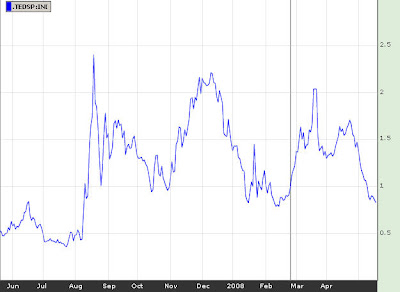Corporate bailout history
Business Week has a slideshow of corporate bailout history. But it included some cases that shouldn't be considered as bailout. I thought bailout should involve public or taxpayers' money. It is quite confusing to say the least.
The logic of collective action
In 1965, Mancur Olson wrote a classic book called “The Logic of Collective Action,” which pointed out that large, amorphous groups are often less powerful politically than small, organized ones. He followed it up with “The Rise and Decline of Nations.” In that book, Olson observed that as the number of small, organized factions in a society grows, the political culture becomes more divisive, the economy becomes more rigid and the nation loses vitality.If you look around America today, you see the Olson logic playing out. Interest groups turn every judicial fight into an ideological war. They lobby for more spending on the elderly, even though the country is trillions of dollars short of being able to live up to its promises. They’ve turned environmental concern into subsidies for corn growers and energy concerns into subsidies for oil companies.The $307 billion farm bill that rolled through Congress is a perfect example of the pattern. Farm net income is up 56 percent over the past two years, yet the farm bill plows subsidies into agribusinesses, thoroughbred breeders and the rest.
Taiwan New President Inaugural Speech
Ma Yingjiu inaugural speech yesterday:
Fear no more
Bloomberg reports TED spread, which measures the difference in yields on three-month U.S. Treasury bills and the three-month London interbank offered rate, or Libor, dropped to nine-month low. Market confidence is coming back.
(click to enlarge, H/T: Bloomberg)
Earthquake and China
Recession call at ivory tower pace
Any call, if it comes, is going to take a while. The NBER usually takes 6 to 18 months to decide when a recession starts or ends. Hall's committee didn't announce the end of the 2001 recession until a full 20 months after the fact.
Robert Hall, Chairman of Business Cycle Dating Committee
Hall says he's a hands-off manager of the process of identifying recessions. "These aren't people who can be directed," says Hall of the committee members. "These are people with a lot of expertise and awareness of what's happened in the past, but it's not a group that has a lot of disagreement." Discussion takes place by e-mail and frequently revolves around a mid-month message Hall sends to committee members containing economic data, including the monthly estimate of GDP growth, as calculated by the St. Louis consulting firm Macroeconomic Advisers.



